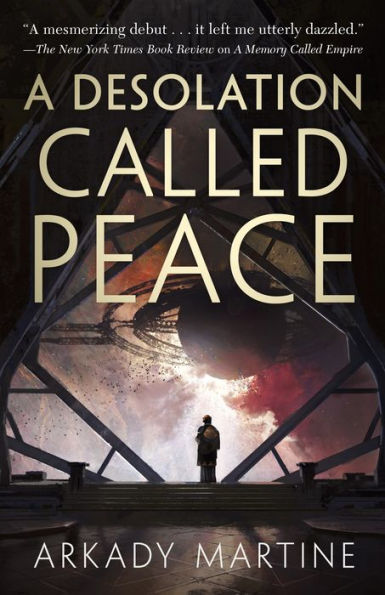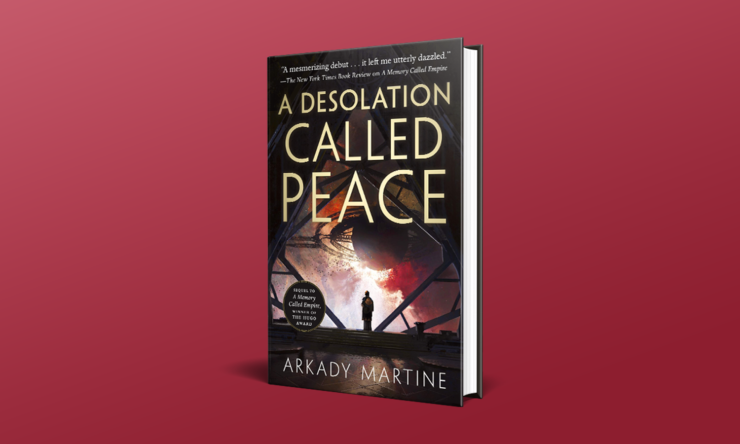In Arkady Martine’s Hugo Award-winning debut novel, A Memory Called Empire, ambassador Mahit Dzmare investigated the mystery of her missing predecessor, becoming embroiled in several national conflicts within the Teixcalaan empire.
As the sequel A Desolation Called Peace begins, Mahit doesn’t know if she’s made the right choices…
[Spoilers follow for A Memory Called Empire]
Ultimately, Mahit helped preserve the succession of the Emperor Six Direction, helped stave off a military coup, and found a new target for Teixcalaan’s appetite: unknown aliens on the edge of Teixcalaan space. With Six Direction’s sacrifice, and the ascension of former right-hand Nineteen Adze, there was a new challenge to meet head-on. But when asked by Three Seagrass, asekreta to the office of Information, to stay, Mahit declined, knowing if she stayed in the culture that she loved but would never love her back, she’d never come home to Lsel Station again.
It’s now been three months since Lsel Station welcomed her back, but they’re unsure of what she brought back with her from Teixcalaan. Mahit isn’t too sure, either. Her broken imago has only made things worse: Two versions of Yskander, the former ambassador, sit in her mind, and their integration has not been easy, setting her nerves on fire—a chronic physical pain to add to the endless fatigue and restlessness that has been with her since returning home. With her government demanding to take her imago out, revealing how it has broken and surely meaning her death, Mahit doesn’t know where to turn.
Meanwhile, back in Teixcalaan, the coup has ended, but the intrigue has not. Eleven-year-old Eight Antidote, ninety percent clone of Six Direction and future Emperor, has begun his training in spycraft and warfare, has found himself at the center of conflicting interests. Emperor Nineteen Adze has sent off newest yaotlek Fleet Captain Nine Hibiscus and her adjutant Twenty Cicada, to the edge of the empire to meet these new aliens head-on. And within Information, a promoted and depressed three Seagrass, struggling with Mahit’s leaving and the death of her friend Twelve Azalea, finds a request from Nine Hibiscus’ ship Weight for the Wheel: they need a specialist in first contact. More than that, they need a linguist and translator, for the very strange reason: these aliens don’t speak language, not as they know. Three Seagrass knows exactly who to ask to help, and she’s waiting on Lsel Station.
Buy the Book


A Desolation Called Peace
This may sound like many threads to keep track of at once, but Martine is a practiced hand at precision storytelling; no taut thread ever loses tension, no one character outweighs another, dramatic moments never sap energy from the events before or after it. From the battlefront to the heart of Palace-Earth to Lsel Station, Martine keeps the reader in efficient, dazzling motion alongside an incredible cast of characters facing a terrifying problem in the face of this new threat: how do we communicate with beings who do not fundamentally understand we are people? And vice versa, are they people, and if so, how do they tell us? Some of the best, most bittersweet parts of A Memory Called Empire come from Mahit’s painstaking fight for her own identity, to carve the lines and boundaries of self out and away from the machinery of an empire she admires. In A Desolation Called Peace, Martine ups the ante by allowing every character, in their own way, to confront and define their own boundaries—the things that make them who they are, and not just cogs in a machine.
These character beats create some of the best moments of the book: the sheer friction that comes of language and meaning, of want and desire, of basic agreed upon reality between beings before a word is even said, and what can happen when those realities are different. Nine Hibiscus and her best friend and adjutant Twenty Cicada must combat the preconceived language of war, the urge to kill those who have killed theirs, in order to truly know if peace can be attained, while those within the ministry of War advocate for their namesake to be writ large across the alien’s home. Eight Antidote struggles with his desire to understand his predecessor, the shadow he lives in, and if he can truly make a difference at such a young age on a war raging across the Empire he’ll inherit, if only he can make his voice known. And Mahit and Three Seagrass once again resume their tentative dance, each of them wanting the other desperately, but their agreed upon reality is not the same; Mahit can’t help but remember how Texicalaan thinks of her, and Three Seagrass, however much she tries, cannot easily grasp Mahit’s feelings of pain and otherness within the system of a culture that will only ever see how she’s not one of them. And even with herself, Mahit’s mind and body struggle against the friction of both Yskander’s within her, a bond begun broken, but growing still.
And this friction of language, of reality, is complicated, Martine reminds us again and again. It’s so much easier to give in, to shout down or ignore entirely or shoot first, and settle questions of personhood later. The real work is difficult, and it gets worse when you remember how deft and intricate the maneuverings of others are around you, like ships converging, unseen in the dark. If A Memory Called Empire was about the seduction of the “civilized,” Texicalaan Empire, even to those it consumed, A Desolation Called Peace is about the cost of that empire and whether or not it can live by the standards it has set. Does a civilized empire destroy when it has the chance to learn? Is an empire the people that make it up, the soldiers on its front lines, its Emperor above them all, or is it a creed, a series of boundaries meant to enforce the very notion of civilization? And can such a creed account for people who are unlike any people ever met? Martine does not let the reader off the hook and brings them face to face with every bloody truth of empire: there are costs to actions, and they are paid for in blood and fire. And sometimes, they are paid for in your very soul.
Amid these huge questions of identity and empire, Martine continues to shine like a star, her prose as gorgeous and cutting as the edge-shine of a knife. Her worldbuilding continues to excel in ways both enthralling and contemplative, even traipsing into some aspects of the Weird, especially in moments where we are given some small insight into the thought process of the alien beings; these interludes are some of the richest, most experimental parts of this book, and some of my favorites. Her flair for distinctive characters set in a rich tapestry of a world whose weaves we know mean that she can run wild in building out the already complicated and intriguing cast that we fell in love with from the first book. It was such a joy to spend time with these characters again, and fall in love with the new ones, too. Swarm, Mallow, and Cure each live in my heart; that’s all I’ll say for now, but trust me, you’ll understand once you’ve read. Plus, there are space kittens, and who doesn’t love a good space kitten?
I’ve barely scratched the surface behind what A Desolation Called Peace did to me; as a reader, it rocketed me through one of the best science fiction books I’ve read in quite some time. As a writer, it challenged me to see how seamlessly Martine crafted her world, looking for a place where the stitches showed and finding only smooth fabric in their place. Overall, it left me breathless with awe, this book that so effortlessly balances being a high-octane, science fiction action thriller, while also simultaneously being a thoughtful, complicated examination of identity, language, personhood, and truth. Arkady Martine has done it again, and made it bigger, bolder, and more beautiful than ever. Don’t hesitate. Read this book.
A Desolation Called Peace is available from Tordotcom Publishing.
Martin Cahill is a writer living in Queens who works as the Marketing and Publicity Manager for Erewhon Books. He has fiction work forthcoming in 2021 at Serial Box, as well as Beneath Ceaseless Skies and Fireside Fiction. Martin has also written book reviews and essays for Book Riot, Strange Horizons, and the Barnes and Noble SF&F Blog. Follow him online at @mcflycahill90 and his new Substack newsletter, Weathervane, for thoughts on books, gaming, and other wonderfully nerdy whatnots.










